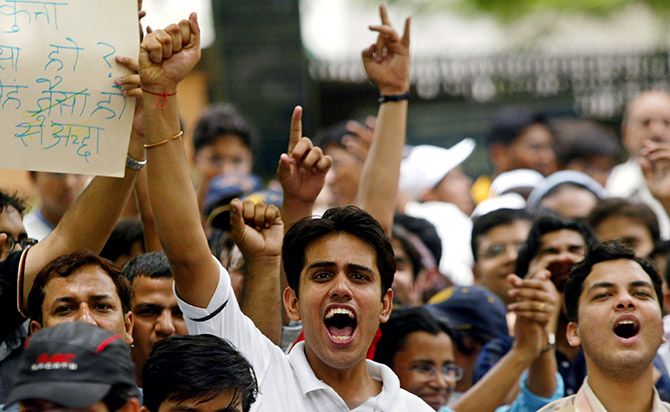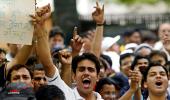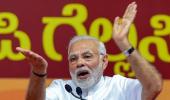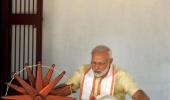The Centre's decision to grant 10 per cent quota for the EWS category in admissions and jobs violates the basic structure of the Constitution on multiple counts including that it breaches the 50 per cent cap on reservation, the Supreme Court was told on Tuesday.

The quota for the Economically Weaker Sections (EWS) is a "deceitful and a backdoor attempt" to destroy the concept of reservations, a lawyer submitted before the court, which was told it also excludes the poor belonging to the SCs, STs, and OBC category and defeats the creamy layer concept.
The 10 per cent EWS quota is in addition to the 50 per cent reservation for the SCs, STs, and OBCs.
A five-judge Constitution bench headed by Chief Justice Uday Umesh Lalit, which commenced the hearing on a batch of pleas challenging the validity of the 103rd Constitution amendment that provided for the EWS quota, heard the submissions during a day-long hearing of arguments by three lawyers appearing for the PIL petitioners opposed to the EWS quota.
The EWS quota is ”a deceitful and a backdoor attempt to destroy the concept of reservations by granting this to the forward class," academician Mohan Gopal, who opened the arguments, told the bench which also comprised justices Dinesh Maheshwari, S Ravindra Bhat, Bela M Trivedi and JB Pardiwala.
”The citizens who are educationally and socially backward as well as SCs and STs cannot take the benefit of reservation even if they fall within the economically weaker sections. This is wholly impermissible as it shows that special provisions have been made in favour of the economically weaker upper classes only,” the apex court was told.
Senior advocate Meenakshi Arora, appearing for one of the petitioners, referred to the constitutional schemes and said, ”The reservation is a class-based remedy to correct the historic injustice and wrongs done to a class of people and it cannot be done on the basis of economic criteria alone.”
Senior advocate Sanjay Parikh said the exclusion of poor belonging to Scheduled Castes (SCs), Scheduled Tribes (STs) and Other Backward Classes (OBC) made this provision for forward classes only and hence it was violative of the principle of equality and other fundamental rights as envisioned by the framers of the Constitution.
The EWS quota provides for vertical reservation to a particular class of citizens on economic grounds alone and excludes the poor of other classes, Parikh said, adding that in other reservations such as quota for ex-servicemen, physically handicapped persons, the persons are not deprived on the grounds of castes or classes.
”By excluding Scheduled Castes, Scheduled Tribes, and Other Backward Classes (the target groups under Articles 15(4) and 16(4)), the impugned provisions deny 10 per cent opportunities to these groups, and in effect reduce the open seats to only 40 per cent for them, while keeping open seats as 50 per cent for the communities other than SCs, ST, and OBCs,” he said.
Even the reservation granted to Persons with Disabilities under Article 16(1) does not categorically exclude members of backward classes, he said, adding that thus, the impugned amendment provides vertical reservations for EWS of the advanced classes to the exclusion of the EWS of the backward classes and hence led to the emergence of an ”iniquitous phenomenon”.
”The principle of equality enshrined in our Constitution is an essential part of democracy, which is a basic feature of the Constitution. The impugned Amendments violate the equality code and, therefore, are unconstitutional,” he added.
At the outset, Gopal submitted that the EWS quota reversed the actual concept of reservation which was thought as a tool of representation for the disadvantaged groups and converted it into a scheme for financial upliftment.
"We must see 103rd amendment as an assault on the Constitution. It seeks to nullify, and neutralise the Constitution's idea of treating unequals unequally. It stabs the Constitution in the heart," the professor said.
Terming the EWS quota to be an example of the "caste-based reservation", he said the existing quota for SCs, STs and OBCs are based on social and educational backwardness and were granted due to their lack of representation in public employment and admissions to government institutions.
Gopal submitted that the Article 15(6), which came into being on account of the Constitutional amendment, violates the fundamental right of equality as it says the EWS quota is for those who are not covered under other reservation schemes.
He said the financial condition of a person or the family may change by events like winning a lottery or losing a gamble and moreover, the impugned quota policy is individual centric.
On the issue of economic criteria, he said the upper limit of Rs 8 lakh per year for availing the EWS quota benefit meant that a family having a monthly income of about Rs 66,000 is eligible.
Ninety-six per cent families earn monthly income below Rs 25,000, he said, adding that this quota scheme has a wide coverage range.
The court would resume hearing on Wednesday.
Earlier, the top court had fixed three broad issues for adjudication arising from the pleas challenging the Centre's decision to grant 10 per cent reservation to EWS in admissions and jobs through the amendment to the Constitution in 2019.
It had said the bench will also decide whether the Constitution (103rd Amendment) Act breached the doctrine of the basic structure of the Constitution by allowing the state to make such special provisions.










